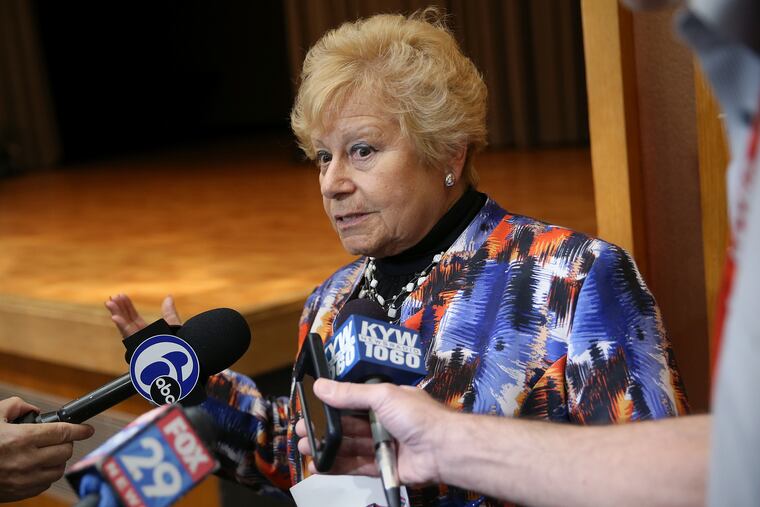Philly’s Catholic high school teachers reject contract, but do not vote to strike
The Archdiocese is seeking a one-time right to lay off staff represented by the Association of Catholic Teachers if the coronavirus pandemic leads to steep enrollment drops.

High school teachers in the Archdiocese of Philadelphia on Tuesday overwhelmingly rejected a contract offer that would have given them a small raise, but left them vulnerable to layoffs if enrollment drops because of COVID-19.
The archdiocese is seeking a one-time right to lay off staff represented by the Association of Catholic Teachers if the coronavirus pandemic leads to steep enrollment drops.
The teacher cuts "would only be adopted if the enrollment dropped by more than 3%, a high threshold,” Archdiocese spokesperson Ken Gavin said in a statement. “Teachers constricted under this emergency situation would have the ability to move to open positions in their field of competency. The system would not need to exercise this clause if all parties work together to maintain a strong enrollment base.”
Rita Schwartz, union president, said that negotiations went through the weekend, but that when she presented the archdiocese’s proposal to her members in a Zoom call Tuesday, “things blew up.”
Teachers realize the pandemic has created extraordinary conditions, but were uncomfortable with giving the archdiocese the ability to cut at will, she said.
“We want to be back in there, and I don’t want to lose the parents or kids on this,” said Schwartz. “But I don’t like it when the employer takes advantage of a pandemic to get things they wouldn’t normally be asking for. Cutting teachers is one thing. But how do you do it and not make that chaotic during the school year? That’s where we got hung up.”
A motion to strike was voted down, Schwartz said. Members authorized her team to continue negotiating until Friday, but Schwartz said she was waiting for a response from the archdiocese.
The archdiocese’s 17 high schools have adopted a hybrid model to start the school year, with teachers in their classrooms five days a week and the 10,400 students shifting back and forth between in-person and virtual instruction. Teachers are expected back at school tomorrow, with regular classes resuming for all students next week.
Until the archdiocese agrees to come back to the table, it’s not clear whether teachers will report to school Wednesday, Schwartz said.
Under the current contract, the union’s roughly 500 teachers are paid between $40,200 and $82,905, depending on experience and education.
Schwartz said the deal she took to teachers would have given them a two-year contract and raises of $1,200 per year. Their current pact expired Aug. 31, but was extended through Tuesday.
The Catholic school teachers' contract is not the only recent one affected by the pandemic.
Cheltenham public schools struck a new contract with the teachers' union in May that grants raises but allows the district to reopen the agreement if local tax revenue drops by 3% or state aid is cut by $300,000 or more. Districts nationwide have laid off or furloughed thousands of teachers and other staff under existing contracts as the economic effects of the pandemic cause revenues to plummet. Some jurisdictions have asked teachers to agree to reopen contracts.
The pandemic has created challenges for archdiocesan schools, Gavin said, “due to difficulties some families have in paying tuition as a result of increased unemployment. The system has also seen a reduction in donations and increased costs in preparing schools for the fall because of the pandemic.”
The archdiocese is seeking flexibility in the contract to “initiate programs which allow those school communities to be more competitive in their market area; for example, the ability to adjust to a non-traditional schedule or to create programs which allow for specialization of a department or program.” Existing provisions, officials said, “are not nimble and often involve a lengthy process to move from concept to implementation.”
Schwartz took issue with that characterization.
“We have been nimble with the archdiocese for years,” she said. “A number of schools have tried different programs, different initiatives, but the devil is in the details. They can make a great proposal, but you have to figure out how things will work.”
Archdiocesan officials warned against a strike.
“The system firmly believes that a strike would not be in anyone’s best interest, particularly our school families, especially as we all navigate the challenge of this pandemic,” the archdiocese said in its statement. “During a strike scenario, teachers are docked at their per diem rate for every day of a strike. Not every strike day would be made up, so whatever gains there would be in salary would be lost due to the docked days in the event of a strike.”
Parish and regional Catholic schools are not unionized or affected by the contract negotiations.